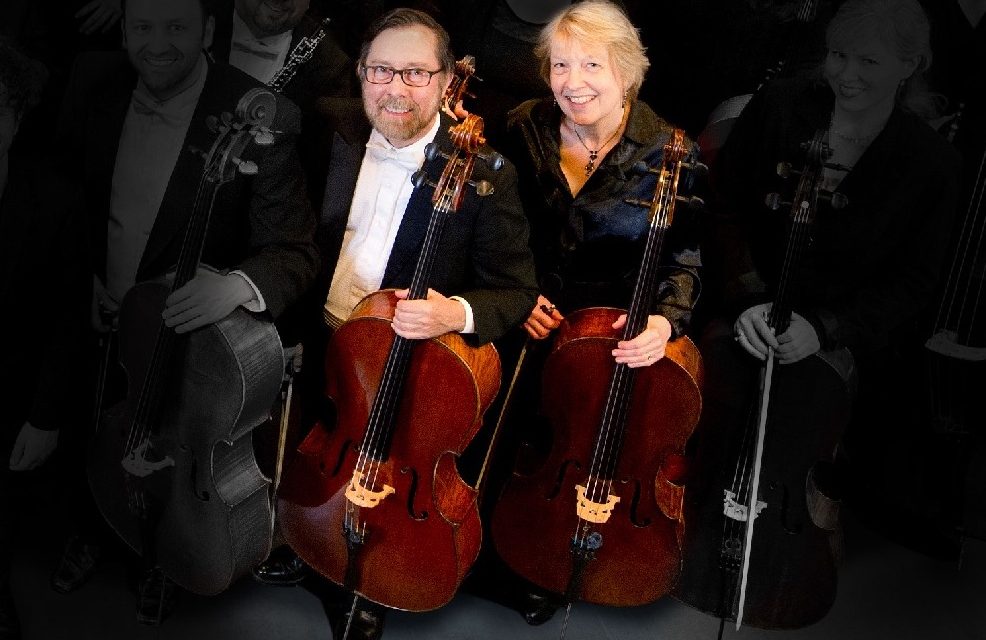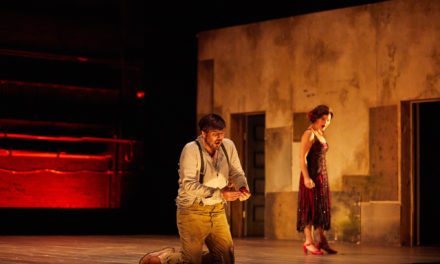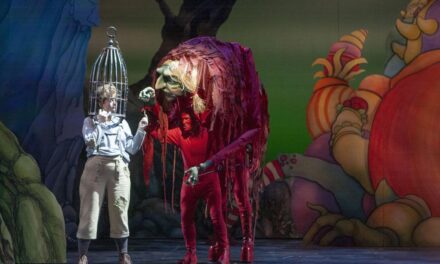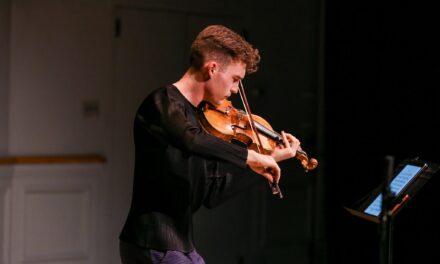Joseph and Debora Caruso. Image courtesy Louisville Orchestra
Beethoven’s Ninth
Teddy Abrams, conductor
Morgan James, soprano
Chloe Tula, harp
Kent Hatteberg, chorus master
Hayley Lipke, soprano
Liz Culpepper, alto
Spencer Lawrence Boyd, tenor
Sonjim Kim, bass
Review by Annette Skaggs
Entire contents are copyright © 2019 by Annette Skaggs. All rights reserved.
The statement “We are so lucky to have Teddy Abrams with us” has been used many times and I am sure will be used many times more. But the statement does not diminish the fact that he is, in fact, a talented and perceptive person. Case in point, the World Premiere of his The Song of the River presented to Louisville audiences on May 11.
In Mr. Abrams address from the podium, he shared that he originally tried to write an ode to Bourbon. But while this piece isn’t necessarily about Kentucky’s official beverage, it is an homage to the life force that is the River. As Richard Wagner brought the Rhine River to life, so does our composer with this piece. The Ohio River is not specifically addressed as the influence and in my mind, that is a good thing. River symbolizes many of the Earth’s waterways in that within each of their banks’ fertility of mind and body can often be found.
Comprised of an Introduction, Canto I-XII, and an Epilogue, River is a sweeping musical story of growth, discovery, heartbreak, and history, based on poems that Mr. Abrams wrote specially for the arrangement. While the water was certainly an inspiration, there is no denying who his vocal muse would be: his lovely and talented friend Morgan James, who we were lucky to see earlier in the season bringing her interpretations of Bernstein classics.
There are fantastic moments strewn through the whole of the piece and I could spend hours speaking to each one of them, but for the sake of time and space, I’ll focus on only a few. Let’s begin with, of course, the Introduction. Immediately I could feel a flow of music emulating the flow of water, cascading notes from the strings trickling along. Images from artist Michelle Oka Doner were projected above the stage in tandem with Mr. Abrams’ lyrical poems and presented in a supertitle format.
While there was hardly any division between the movements, you could certainly tell there were different styles and themes as each section premiered. Canto III: Consumption had a bouncy beat to it, then to Canto IV: Surrender that lent itself to a little jazziness in the cellos and violas, while in contrast, Canto V: Song of the Builders had whispers of, well, people building. The use of the ratchet was clever.
Canto VII: The Powerful had a pop music jive to it that then went into the waltz of Canto VIII: The People. Canto X: Nostalgia couldn’t have been scored better as its guitar and winds were delivering a folk-song sing-a-long feel. And letting that feel good moment keep spinning, Canto XI: Balance’s organ and celeste moments were lovely.
While I feel that the composition and writings that are contained within Canto XII: Song of the Golden Age would have been a beautiful and satisfying ending to an entertaining piece of music, the Epilogue: Song of the River, featuring Chloe Tula on a sublime harp solo, was the icing on the cake. What would have made Ms. Tula’s performance even better – if an audience member remembered to turn off their cell phone?
Vocally, Ms. James was a busy lady. There were very few moments that she had a chance to rest. And while her lower and middle voice were in perfect form that evening there were some top notes that I could see she was just reaching for. Perhaps it was a matter of key signature or fatigue, but when she did reach the top, she let it ring.
While Mr. Abrams stated that this piece is a requiem of the past, present, and future, I could digest some of that. One of the closing lines is: “We Are What We Are”. But with my optimistic ears and nature, I could hear the sounds of the whys, what-fors and what can we do to change the course. This orchestration is demonstrative of addressing our past and present to create our future.
As the audience returned from the intermission the stage was filled with singers. Over 100 of them. What in the world would prompt the need for such a huge chorus? Beethoven’s Ninth of course.
The four-movement Symphony No. 9 in D Minor, Op.125 is known far and wide and is considered a standard bearer for music written ever since. While it took Beethoven a few years to orchestrate the piece that is partially centered on the works of Friedrich Schiller’s “Ode to Joy”, scholars have longed argued as to what was the particular theme of this symphony. Brotherhood? Joy? Life? Love? Loss? The answer lies with Beethoven himself.
Whatever the catalyst was for the creation of this masterwork, we are all the better for it. While the words that accompany are not what many consider as poetic, they do make us think, they make us feel.
The Allegro begins and we are immediately thrown into a sense of the genius yet to come. A blaring of horns (don’t be hesitant horn section) and beautiful octave movements within the violas signifies glory. The intensity keeps building and building, whether it is in the rhythm or in the sudden, yet short, shifts in tone. The instrumentalists must keep on their toes.
Molto vivace announces itself with a blaring strike from the tympani to set the pace. This movement is so demanding, frenetic, and alluring that the musicians and the conductor must take a small break, during which Mr. Abrams remarked to the audience “at least I didn’t almost faint this time.”
The third movement’s Adagio molto makes you take a breath and reflect. The music contained herein is separate from what we just experienced. Two strong themes are present throughout that are reminiscent of calm and tranquility. There is an especially beautiful line shared between the second violins and violas.
You are in a state of serenity after hearing the almost ethereal motif and then all of a sudden there is a jarring note from the horns that stirs the emotions. It is when the lower strings offer up a melodic line that quells the din of the other noise to which the whole orchestra responds with their approval of the new sound, the new music, the new identity. That identity would be the known hymn “Ode to Joy”. In a thunderous roar throughout the whole of Whitney Hall, the collective of musicians, instrumentalists, and vocalists alike, alighted in the beautiful exaltation of these glorious sounds.
For the most part of the chorus did quite well and had strong sections. I will mention that there were a couple of times that the need to watch the conductor or to work on collective breathing was noticeable, but for the number of voices up there, it was quite fantastic.
While the soloists were good and certainly on their way to what will be successful careers, there were two standouts among them: Alto Liz Culpepper and Bass Sonjim Kim. Ms. Culpepper was clean and clear and I could hear her even when the higher voices were in their higher register. The same can be said for Mr. Kim, whose voice was silky and suave.
Truly it was an evening of great triumph and joy.
I’d like to wish Joseph and Deborah Caruso, cellists for the Louisville Orchestra for a number of decades, a very happy retirement. Principal Cellist Nicholas Finch shared with the audience that it is not often that one gets to work with a couple as professional and hospitable as Mr. and Mrs. Caruso. Their dedication is a testament to the craft and art form of music.
As the Louisville Orchestra takes a little break for the summer I would like to applaud the musicians and staff at the LO for their tireless devotion and work to make our Louisville Orchestra the most interesting orchestra in the world.
Bravi Tutti!!
Beethoven’s Ninth
May 11, 2019
Louisville Orchestra
Whitney Hall, Kentucky Center
501 West Main Street
Louisville, KY 40202
502-584-7777
Louisvilleorchestra.org
Annette Skaggs is heavily involved as an Arts Advocate here in Louisville. She is a freelance professional opera singer who has performed throughout Europe and in St. Louis, Cincinnati, Boulder, Little Rock, Peoria, Chicago, New York and of course Louisville. Aside from her singing career, she has been a production assistant for Kentucky Opera, New York City Opera, and Northwestern University. Her knowledge and expertise have developed over the course of 25+ years’ experience in the classical arts.





